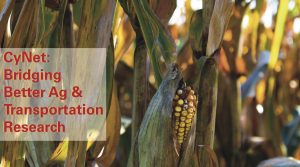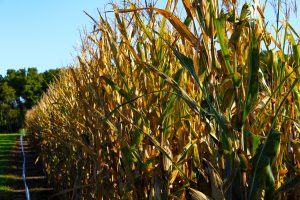 In today’s world, computing and networking is everywhere. To continue innovating, inventing and discovering new things, electrical and computer technology is crucial to furthering breakthroughs in many domains.
In today’s world, computing and networking is everywhere. To continue innovating, inventing and discovering new things, electrical and computer technology is crucial to furthering breakthroughs in many domains.
Hongwei Zhang, associate professor at Iowa State University in the Department of Electrical and Computer Engineering (ECpE), recently received a $999,919 grant to help further technology-related research in the world around us, specifically in agriculture and transportation. Besides Zhang, who is the project’s principal investigator, the project lead team members include College of Engineering Associate Dean Arun Somani, ECpE Professor Ahmed Kamal, Director of the Plant Sciences Institute Patrick Schnable and Civil, Construction and Environmental Engineering Associate Professor Anuj Sharma.
“We thought about how we could bring advanced computing and networking capabilities to help tackle challenges in agriculture and transportation,” Zhang said. “And with this thinking, we proposed to develop and deploy CyNet at ISU.”
CyNet is a network that collects information from different sources and stores the data in a cloud. The CyNet cloud will be located on campus in a database. CyNet will absorb data, such as phenotypes of plants in agriculture, or gather data from vehicles to study. This network will make retrieving data more efficient by quickening the time it takes to gather information and allowing researchers to study the data on campus without having to leave their offices.
“With CyNet, data in fields or on the road will be streamed in real time, with researchers just sitting in the lab and analyzing the data,” Zhang said.
The specific objective of this project has three main components. The first is developing an advanced wireless networking solution, which is CyNet. The second and third steps are deploying those solutions and trying them out in field.

With agriculture, CyNet will save researchers time and money they would spend traveling to fields. Instead, researchers can connect a camera in the field to CyNet and can observe image processing of a crop at a farm from a lab on campus.
“We want to deploy this research on campus, connecting places like Curtiss Farm to a cloud on campus,” Zhang said. “CyNet will help better agriculture, which is part of our mission here at ISU.”
“To transfer images of plants taken by hundreds of cameras deployed on farms takes a lot of bandwidth,” Kamal, Co-PI of the project, said. “We are going to provide plant scientists and transportation engineers with a network infrastructure for transferring the images to the cloud for storage and processing, and the images will still retain a high quality.”
Relating to transportation, sensors would be placed in vehicles and relay data back to campus through CyNet.
“The sensors in the cars may be able to measure deceleration, acceleration, speed, turns and other automatic controls,” Zhang said. “With the network, hopefully we can connect cars on the road back to a base, enabling transportation research.”
CyNet will boost research toward networking solutions in automated vehicles. By placing a device in a car or on a plant in a field, agriculture and transportation research will be enabled and potentially allow researchers to deploy data from far away.
“CyNet will actually be serving the application domain experts by providing them with the infrastructure to be able to conduct their research,” Kamal said.
By conducting research on automated vehicles, the goal to ride in self-driving cars with no risk is closer than ever before. And with self-automated vehicles, cars can communicate with each other and prevent collisions.
“If you think about the role automated transportation can play, it can reduce or potentially even eliminate accidents,” Zhang said.
Not only will Cynet enable research in smarter and safer transportation and environmentally safe agriculture, but the goal for the team, to improve the lives of people and the world, will also capture the attention of underrepresented students, bringing them into ECpE, Zhang said.
“For underrepresented students, female or minority students, they tend to be more excited if they can see innovative solutions in a certain field,” Zhang said. “They like to see how they can make this world a better place to live.”
Students will also get to experience how smart transportation and agriculture will work in the future.
At the end of the project, the network and algorithms will be developed and deployed in the field. With the grant, Zhang and his team plan to have all of this completed in just a few years.
“One important goal for us, that the grant will help with tremendously, is in about two to three years the whole CyNet system has to be up and running,” Zhang said.